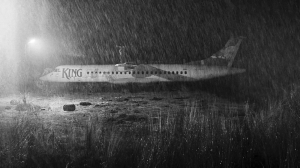
.jpg) Photo Courtesy: Magda Wrezeszcz
Photo Courtesy: Magda Wrezeszcz
Writing for a movie (especially one that requires ensembles, orchestration and has mood swings that demand the same of its soundtrack) is no easy feat and one that requires a level of musical understanding and study. Oliver Weeks, the composer for the indie film Cat Sticks, is no stranger to this. He has composed everything from live arrangements, played in a live fusion setup and done the aforementioned film work. In this part of the interview, he speaks more about his style and the creative limitations he worked under while making the movie.
6. Considering that the movie has some quintessentially Indian and Kolkata-centric elements to it, did anything from the city stand out to you while choosing sounds for this soundtrack?
I was instructed from the start to write very 'Western' music. I actually had hoped to use more Indian elements in the score (which are really part of my style now) but the tug-of-war with the rest of the team led me away from this. The sound design absolutely recreates the Indian ambience in incredible detail, so much that music could hardly add anything to it. My music provides something else, perhaps a gravitas, something foreign, outside this. Apart from points where something is literally playing on the radio (say in the trucker and slum scenes), the song written by Moushumi for the closing credits is the only piece of Indian music in the film, the first and only point where a singing voice is heard (and that totally unadorned) after all this heavy instrumental music. It's a very cathartic moment when she starts singing, all the more so for having been delayed so long and it acts as a last word, an epitaph or a lament.
7. There’s a lot of acoustic guitar throughout this soundtrack that has a shy and introverted sound compared to the orchestral stuff, which is grander and outgoing. Since you play piano and guitar, what instrument do you like to compose in (if there is one)?
I write on both instruments but I also write a lot old school with pen and manuscript paper. All are valid methods; it's important to mix things up and keep changing how you write in order to surprise yourself. I remember once reading about how Lennon and McCartney did this to an almost obsessive degree and I took it to heart as it's so easy to get bogged down in the tedium of composition. Writing on an instrument can be good for immediacy but sometimes more abstract planning work is required – especially on larger pieces or pieces with structures that are more than simple song forms. I also write a lot when I'm just hanging around not actually working, waiting for the bus, getting a coffee etc (the sort of times that nowadays people spend fiddling with their phones).
Another way of doing this is by collaborating. I used the film as an excuse to call up friends and re-boot creative partnerships with them. I did this with the music from the club scene in the film, where I called up a friend I'd been in a band with many years before. I had a vague idea of doing a rain-soaked Brit indie EDM New Order-type track for this but it ended up somewhere very different, which is the joy of working in an unpredictable way. As happened with several songs I wrote for the film, we stripped away the vocals as we felt they would impinge on the film's soundscape in an overly alien way but there's a whole shiny pop nugget there which will have to wait for the soundtrack album..
The introverted acoustic songs I already had sitting around and donated them to the soundtrack. For example the first musical cue after the opening credits, a song I wrote a few years ago, I had already done as a demo recording on a crappy guitar in a flat in Bucharest. It had a nice vibe so I kept the guitar but removed the vocals (no big loss) and worked the melody into a web of violin parts instead. I fancied the idea of having to my name a genteel 60s-style fingerpicking folk guitar instrumental with a girl's name for a title (like Angie or something), so I called it Orna – she is the only female character in the film after all…
.jpg)
8. Seeing that you have done arrangements for Elton John and Jonny Greenwood among others and been on films of many genres, in what way does working on a live performance (which is visual and theatrical in its own way) differ from, say, a comedy-satire movie?
I haven't scored a comedy-satire movie (I'd like to) but a live performance brings its own annoyances and rewards. When writing for, say, a classical ensemble, or playing in a band, it's impossible to escape the ritual and sense of occasion of a concert (people have certainly tried), the lack of rehearsal time (in the UK, anyway), any number of acoustic, musical and logistical problems and the possibility that, no matter how experienced you think you are, a certain passage might not work and you might not find out until rehearsals. But unlike film, where everything has to be finalised and committed to some kind of medium that can't be changed, all kinds of spontaneous magic can happen in a live performance. I'm not a regular gigging musician at the moment due to having a young family but I wouldn't want to give either thing up. Sitting in a studio is never going to fully substitute for the buzz of playing live but neither would I want to give up the chance to really meticulously work sound as you can do in a studio.
9. You have been exposed to and played a lot of different kinds of music in your time. What made you decide to study composition (at RAM, to boot) in such great detail?
Once I decided that I would do this professionally, I didn't at any point consider not studying to as high a level as I could. I've always played a lot of different kinds of music and this is part of my background, much of which I get from my father, who played folk music in pubs in St. Albans in his teens, then ditched rock music in the 70s a taught himself jazz and classical music. I wrote my first 'piece' when I was 5 or 6, following this up with ambitious - and hilarious - scores such as a piano concerto written when I was 8 (written on green manuscript paper.) I began the guitar a bit later, when I was 10, and, as I had access to a four-track tape machine, I immediately, with the confidence of youth, started writing and recording songs as well. As a child of the 80s, the sound palette was guitars, basic synths and a drum machine. Guitarist, singer, producer, songwriter and programmer! These two streams – two types of music - are something I've been trying to make inhabit a similar world since then. Writing for film is one way I've found to make this make sense.
10. Considering the idea that Bollywood movies in most cases are musical with a story stapled on to the end, what do you think a non-intrusive soundtrack would sound like for typical Indian popcorn fare? There have been a few attempts to do this (Gangs Of Wasseypur, maybe); do you think this can work?
Bollywood, as the mainstream of Indian popular culture, is subject to exactly the same economic forces as Hollywood and the music industry in the West and is no better or worse as far as I can tell. Of course I think a non-intrusive soundtrack very much can work, and does work on the few occasions where the right creators get the chance to work according to artistic rather than profit considerations. I wouldn't phrase it as a 'non-intrusive' actually - I'd say such a thing would simply be a good soundtrack and really ought to be the norm. The question is more whether these soundtracks can even get commissioned in the brutal world of the modern culture industry (mostly they don't), though clearly some do manage to fall through the cracks.
As a musician, I really hate intrusive, or bad, use of music – I'd rather have silence. I used to rail against composers of lousy music in films, TV etc but I now feel that the soundtrack is only going to be as good as the taste of the director, producer, accountant – whoever is really calling the shots on a film. I will no doubt end up doing a lousy soundtrack at some point as, no matter how hard you try, there's always going to be a stinker in your career somewhere. It's inevitable that at some point you'll find yourself either collaborating with people with whom everything turns to shit or on something with a fundamentally bad premise. Such projects get such in a sort of ‘development hell’ where everyone's vision gets trashed (a bit like Brexit or the Super Mario Bros film). That's how you learn. Luckily most of my failures have been fairly low-key and thus educational but not career-destroying. Cat Sticks is one of those rare projects where not only everyone involved was top-notch (and it was a first feature film for many of us), but where all these talents had space in which to do something really special.
Composer Oliver Weeks talks about his process and how a film can influence its score




Leave a comment